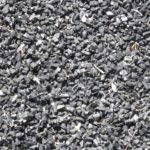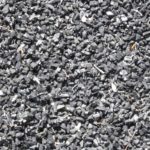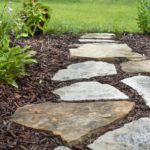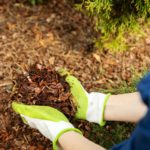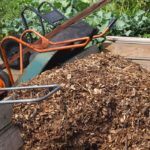Applying mulch to a garden can improve its aesthetics and protect the plants from extreme temperatures. It can also prevent weeds from spreading and save your garden from soil erosion. But is it a good idea to use a synthetic material like rubber mulch in your garden?
Rubber mulch has several benefits and downsides. It’s a great insulator, protects the soil from weeds and pests, and prevents soil erosion. However, it may also release toxins into the soil, and cause the soil to overheat in the summer.
If you don’t want to replace your mulch yearly and prefer something that is soft and comfortable to walk on, rubber mulch may be the ideal option for your property. Let’s compare the pros and cons of using rubber mulch so you can make an informed decision on whether it’s right for you.
What Is Rubber Mulch?
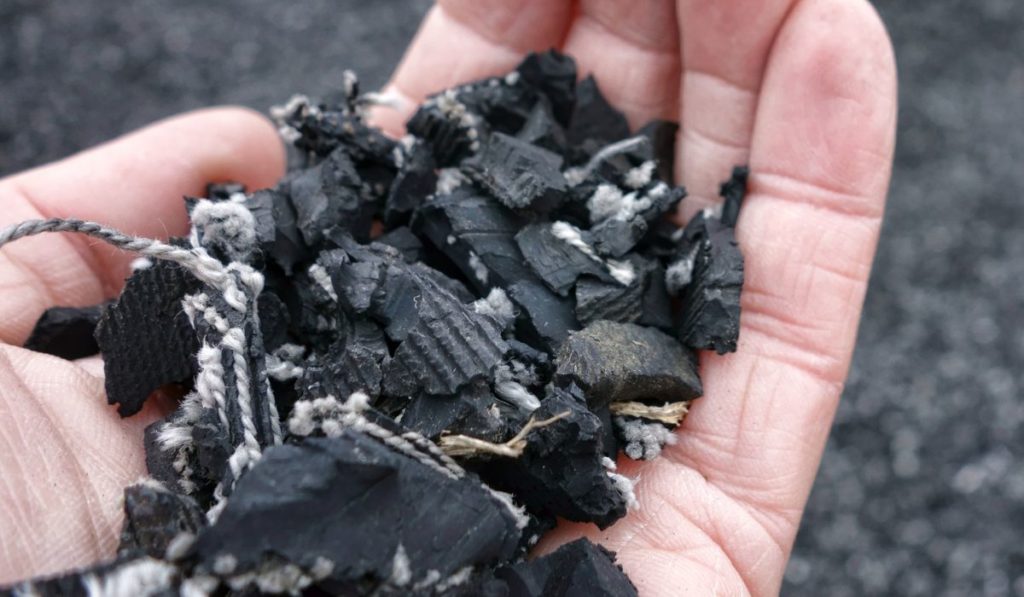
Rubber mulch is mulch made from recycled tires and other pieces of rubber. It resembles organic mulch but is more permanent and won’t disintegrate.
While rubber mulch is often made from recycled tires and other recycled rubber, some companies make special mulch using biodegradable rubber.
Rubber mulch blends in well with any garden setting and works in both lawn gardens and for landscape gardening. Although it doesn’t break down like organic mulch, you also won’t have to replace it more often.
Rubber mulch can be applied around trees, shrubs, flowers, and other plants as the perfect insulator. You can also get green rubber mulch (on Amazon) to use in lawn gardens.
If you’re looking for synthetic mulch that blends in well with any garden type and won’t alter the natural look of your garden, rubber mulch is a great choice.
Benefits of Rubber Mulch
Rubber mulch has become an especially popular type of synthetic mulch in recent years for its effectiveness and durability.
It doesn’t need replacing as often as other mulches, and it won’t affect your garden if it’s made from quality rubber. So, what makes rubber mulch ideal for your garden?
It’s Almost Permanent
One reason why many people prefer to use synthetic mulch is because of its longevity. You don’t have to replace rubber mulch as often as organic mulch since most types of rubber mulch will easily last 10 years or longer.
For comparison, if you use organic mulch, such as wood clippings or shredded leaves, you’ll have to replace it after 6-12 months. Rubber mulch also doesn’t need any maintenance and retains its look over the years.
It Suppresses Weeds
One often overlooked benefit of mulch is that it can be used to control the growth of weeds. Rubber mulch is also effective in reducing weed growth as it blocks the sunlight, disrupting the germination of most weed seeds.
Rubber mulch is also more compact than other types of synthetic mulch, which makes it better at suppressing weeds. Apply mulch to your lawn or flower beds and you’ll notice fewer weeds over time.
It Improves Soil Drainage
While rubber mulch doesn’t disintegrate easily, it still helps improve soil quality by allowing water to drain more slowly.
Rubber mulch will also reduce the rate of evaporation, which may be effective in helping the soil retain more moisture. This is great in summer as you won’t have to water your plant as often.
It Insulates Plants and Garden Soil
One of the main reasons why people use mulch is because of its usefulness as an insulator. Rubber mulch is a great insulator and will protect your plants from extreme temperatures. You can use it in both winter and summer to protect plants from the heat or frost.
Rubber mulch will also keep the soil’s temperature more stable, preventing plants from dying due to autumn frosts. You can also get rubber mulch in different colors according to your climate. Black mulch (on Amazon) is ideal for colder climates, while light-colored rubber mulch is better at insulating your plants in hot climates.
It Prevents Soil Erosion
While organic mulch such as straw or grass will also prevent soil erosion, these materials don’t hold well in heavy rains or windy conditions. Rubber mulch is more durable and won’t be washed away as easily, protecting the topsoil from erosion.
Rubber Mulch Doesn’t Attract Pests
One of the main problems with organic mulch, such as bark or grass clippings, is that it becomes an attraction for insects as the mulch decomposes. Rubber mulch doesn’t decompose and won’t attract pests, keeping your garden free from irritating insects.
If your garden has a problem with carpenter ants, wasps, or similar pests, use rubber mulch to control them.
You Don’t Need to Apply Large Quantities
Because organic mulch decomposes much faster, you’ll have to apply at least 3-4 inches for the mulch to be effective. In comparison, you’ll only have to apply 1.5 inches of rubber mulch. You also won’t have to replace it often, making it a more permanent solution.
Downsides to Rubber Mulch
While rubber mulch is a great alternative to organic mulch, it has its downsides. Rubber mulch is synthetic, and certain types may release harmful chemicals into the soil.
Rubber mulch will also fade over time and attract bugs that may be harmful to your plants. It’s also more suitable for cold climates since the rubber can get quite hot in the sun.
Let’s explore some of these downsides of rubber mulch:
It Fades Over Time
While rubber mulch retains its color better than organic mulch, it does fade over time. This can affect the aesthetics of your garden, and you’ll need to add another layer of mulch to keep your garden looking tidy.
Fortunately, many manufacturers claim that their rubber mulch doesn’t fade for at least 10 years, so you shouldn’t worry about this for a while!
It May Release Toxins Into the Soil
Another issue with rubber mulch and other synthetic mulch types is that they may break down over the years, releasing harmful toxins into the soil. These toxins may stunt plant growth and can be difficult to remove.
While some types of mulch are manufactured from rubber that’s safe for the environment, most rubber mulch is made from recycled tires. This rubber will release harmful POVs when exposed to the sun, posing an environmental risk.
It May Attract Bugs
Although rubber mulch does repel certain pests like wasps and carpenter ants, it also attracts other pests that may damage your plants. If you notice an increase in certain types of pests after applying rubber mulch, you’ll have to use other forms of pest control to keep them in check.
It’s More Costly
One of the issues with rubber mulch is that it’s more expensive, at least initially. Even though rubber mulch is usually made from recycled tires, it’s still more expensive than many types of organic mulch.
For example, you can rake the leaves in your garden and use them as free mulch, but rubber mulch always comes at a price.
However, in the long run, rubber mulch may be cheaper since you don’t have to replace it every year.
Rubber Mulch Heats Up the Soil
The insulation of rubber mulch can be an advantage, but it’s also a problem at times, especially in the summer. Rubber can heat up and retain heat much faster than organic mulch. This can cause problems for your garden in very hot weather.
Is Rubber Mulch Right for You?
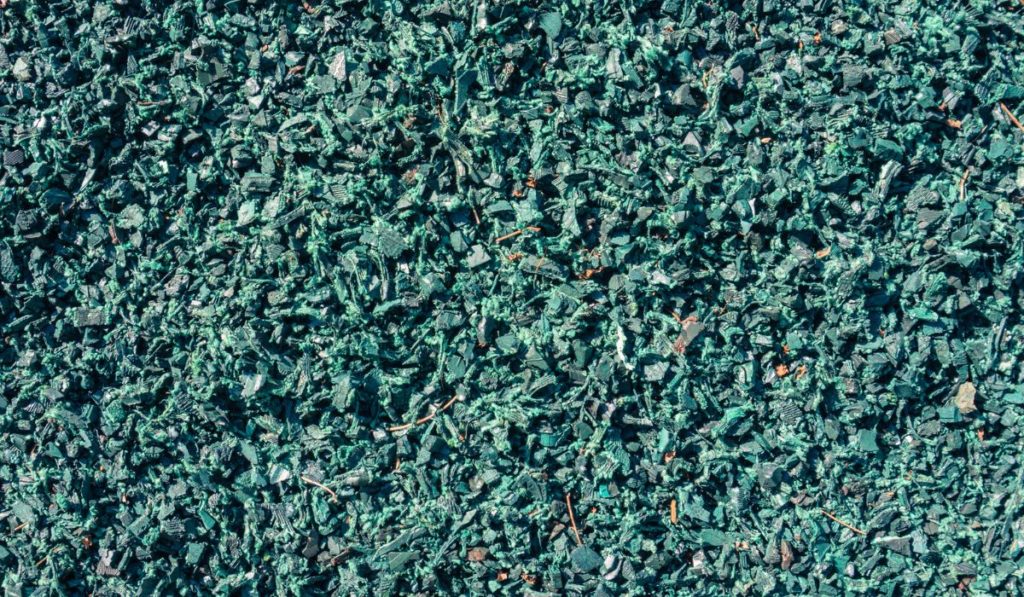
Even though organic mulch is still the most widely used option, many people are switching to synthetic mulches such as rubber mulch. So, how do you know whether rubber mulch is right for your garden?
If your garden has kids running around regularly, rubber mulch is more effective. It’s soft and isn’t a hazard as compared to pebbles or wood chippings. Rubber mulch is also better for gardens that require minimum maintenance.
However, if you want to keep things natural or need to use mulch in a vegetable garden, you may be better off using organic mulch.
Your Rubber Mulch Options
If you’re looking for the best rubber mulch for your garden, you’ll have to consider the costs based on your garden type and other requirements. According to HomeGuide, rubber mulch costs around $80-$160 per cubic yard. This is significantly more expensive than wood mulch, which costs around $24 per cubic yard.
If you’re going to apply mulch in a larger area, you can buy it in bulk. This is much cheaper but still costs around $300-$800 per ton. Fortunately, once you apply rubber mulch, you won’t have to replace it for a couple of years, so your long-term costs may be on par with organic mulch.

